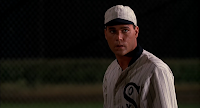"Field of Dreams" is a story about believing in the impossible and remembering lost or forgotten dreams (as well as, to some degree, the essence of finding and experiencing new ones). It fits comfortably in the classic sports film category and also, what I consider, the "beyond-sports" movie category. By this, I mean that the film isn't really about sports, but about human characters and what they go through, what they struggle with, and what they seek to overcome, by means through sports.
"Field of Dreams" (based on the novel by W.P. Kinsella) is a story that features real people in fantastical situations. From ghosts of old baseball players emerging from cornfields to hearing voices to time travel back to the early seventies, all of these elements create a thematic scope that recalls the magic of the game of baseball, as well as the regrets and reconciliations between fathers and sons.
Ray Kinsella (Kevin Costner) is a man who believes he's "never done a crazy thing in [his] life" and fears that he may become like his father in doing so. That is, until one day he hears a voice that he eventually believes is calling him to build a baseball field so that the legendary "Shoeless Joe" Jackson (Ray Liotta) may come back to play. Despite criticism from neighbors in the community and the risk of losing his farm, Ray is supported by his wife, Annie (Amy Madigan), and daughter, Karin (Gaby Hoffman), and in time they begin seeing the ghosts of old players on the baseball field Ray built. (This actual field in Iowa has since then become a landmark, year after year.)
Other characters brought into the story include the reclusive author Terrence Mann (James Earl Jones) and the mysterious Dr. Archibald "Moonlight" Graham (the late Burt Lancaster). Mann was a writer on Civil Rights from the 1960s who lost his passion in recent years, as well as his dream to play for the Brooklyn Dodgers and with Jackie Robinson. Graham, on the other hand, was once a young ballplayer who only got to play one inning of but never got to bat. In one of the films most compelling scenes, the aging "Doc" Graham explains how he gave up the game to pursue a career as a doctor and returned to his hometown of Chisholm, Minnesota. Ray even invites him to come to his baseball field, because it's "where dreams come true."
Many viewers may find all these elements to be too ambitious and overrated. But again, it works thematically, because it represents the memories and magic of the game of baseball--which isn't just limited to Jones' memorable monologue at one point in the film. This makes "Field of Dreams" an unforgettable fantasy-drama.








